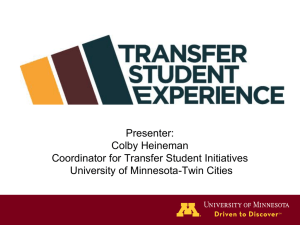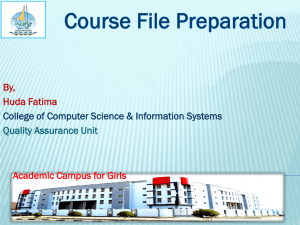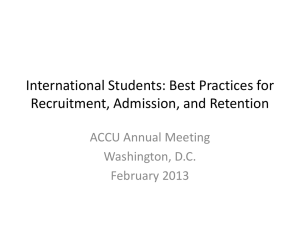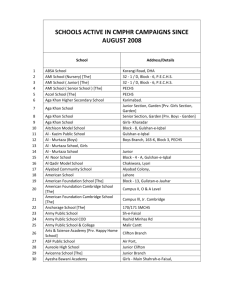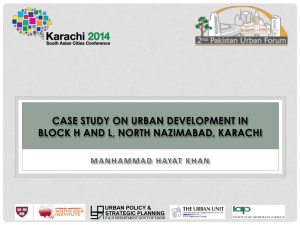Job Satisfaction
advertisement
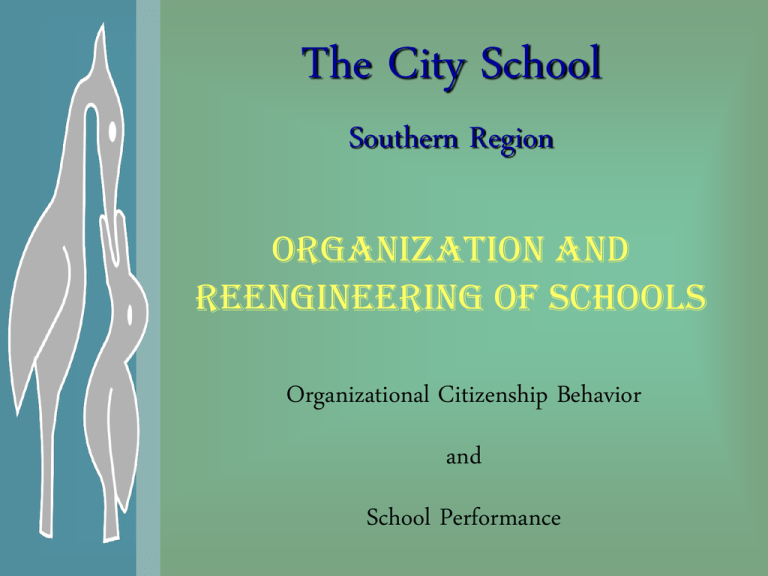
The City School Southern Region Organization and Reengineering of Schools Organizational Citizenship Behavior and School Performance Group Members Group Leader Naila Durrani – PAF Chapter Southern Region Neelofar Masood - TKS, Gulshan Gulrukh Ahmed - Jr. D, Gulshan Asifa Durr-e-Shahwar – Gulshan Campus Erfa Iftikhar - Gulshan Campus Zaibi Kanwar - TCK, F.B.Area Nuzhat Zaidi - TCK Jauhar Tazeen Rizwan - Sr. Boys, N. Nazimabad Farheen Shafiq - Jr. B, N. Nazimabad Ghazala Saeed - Jr. Boys, N. Nazimabad Zehra Tariq - Prep Boys, PECHS Farida Karbalai - Sr. Boys, PECHS Naheed Aamir - Jr. C, PECHS Farrina Khan - Jr. Girls, PECHS Sadiqa Maaz - Quetta Campus Uzma Khalid – Jr. Branch, Quetta Afshan Syed - TCK II, Quetta Humaira Tabassum - Pre Jr. Quetta Maria Mahpara - PAF Chapter Aliya Khalid - Jinnah Campus Farzana Bandukwala - PAF Chapter Parveen Qureshi - TCK, Qasimabad Rukhsana Afroze - PAF Chapter Ishrat Fatima - Jamshooro Branch Sarwat Arbab - Defence Campus Rehana Sana - TCK Sukkur Rehana Sohail - Defence Campus Anjum Raza - Nawab Shah, Senior Neemat Shamoon - Darakhshan Campus Nabila Asghar - Pre Jr. Hyderabad Asma Zareen - Darakhshan Campus Fauzia Abbas- Liaquat Campus Asma Jan Ghaznavi - TCK I, Gulshan Aftab Ahmed -Jinnah Campus Mehran Region Basic Concept of Organizational Citizenship Behaviour (OCB) There is a striking similarity between a state and an organization. A state or country works for the development of its citizens. In addition to providing rights to them, it can motivate its citizens to contribute to their duties. Similarly, in an organization driven by a strong leadership, employees can be helped to understand the importance of their role and to go beyond the call of duty by making them citizens of the company/school. Definition of OCB Individual behaviours of employees that are beneficial to the organization and are discretionary, not directly recognized by formal reward system but rather a matter of personal choice. Job Satisfaction Attitude Components of OCB Accountability Attitude Positive or negative feelings/thoughts about objects, people or events. Attitudes are important because they affect job behaviour. Cognitive: Often comes from personal values Affective: The feeling component Job Satisfaction Fairly paid salary Good Interpersonal relations with employer and co-workers Motivation through appreciation or bonuses Opportunities for promotion Appropriate (happy and hygienic) environment Up to date equipment/ resources Job security Empowerment and trust Assigning task according to the employees’ interest and talent Clear cut working policy Professional training and personal grooming Job Involvement Self determination Contribution to company’s success Supportive to co- workers Trusting the organization Freedom to set one’s own workplace Organizational Commitment The strength of an individual’s identification with an organization. Affective Commitment Positive emotional attachment Continuance Commitment Cannot afford to leave due to economic and social costs Nominative Commitment Perceived obligation to remain Accountability Acknowledgement Unfair Appraisals Job satisfaction commitment involvement Job Dissatisfaction Withdrawal/ Turnover Where Do We Stand Now? Attitude The school ethos and culture is based on positive attitude. Job Involvement Loyalty with the organization and performance of duty not related to the reward system but by choice. Job Satisfaction Competitive salaries and opportunities for professional development through inservice and on job training. Organizational Commitment High commitment with the organization creating The City School family. Accountability A fair system of appraisals and promotions. High Organizational Performance High Organizational Performance in relation to Organizational Citizenship behavior has certain theoretical consideration which suggest the aligning of People, Strategy, and Process through: 1. Defining High-Performance Organization 2. Identifying Gaps Between Current and Desired Culture 3. Selecting, Developing, And Retaining The Best People 4. Creating And Modifying Processes To Support The Culture 5. Communicating Effectively At All Levels 6. Designing and Aligning Reward Systems 7. Developing Metrics To Assess Progress (Gravenkemper & LePla 2009) Keeping this theoretical framework of high organizational performance in mind, specific suggestions can be made to Reengineer the existing practices in The City Schools. Recommendations Better communication at all levels through regular meetings, interactive sessions and newsletters. Provide forum for collective problem solving. Increase delegation Development of a more effective and comprehensive system of staff selection. In the grasslands, somewhere on the African continent, success can be defined in terms of life and death, Survival is a strong motivator. Here’s a short story … When the light comes in the Eastern sky and you sense that the sun will soon steal the comfort and security of the night, the gazelle starts to stir. He knows that if, during this day, he does not run faster than the fastest cheetah, he may be caught and then he will be killed. Not far away, the cheetah stretches out his powerful muscles and thinks of the day ahead, He knows that if he does not run faster than the slowest gazelle, he will surely starve. The moral of this story … It doesn’t matter whether you are a gazelle or a cheetah … …when the sun is up … … you had better be running.

